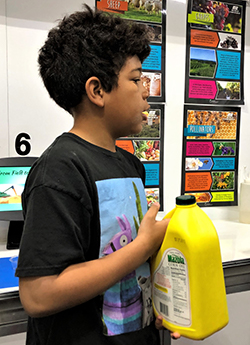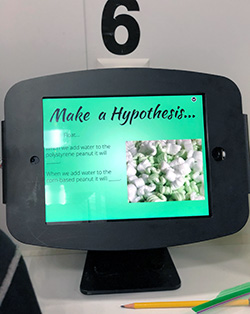Did you know disposable plates can be made from corn? To find out more, you might want to ask an Appleview Elementary fourth grader.
Just days before district schools were closed in March to help stem the spread of the coronavirus, fourth graders were treated to a visit from FARM Lab. The colorful, 40-foot mobile classroom, complete with work stations, was parked outside Appleview for a day of hands-on STEM-based lessons.

FARM lab — which stands for Food, Agriculture & Resources in Motion — is the brainchild of a group of farmers working with 26 Michigan county farm bureaus, spearheaded by local dairy farmer Renee McCauley. Lessons align with Next Generation Science Standards. Through sponsorship by the Michigan Foundation for Agriculture, Michigan Agriculture in the Classroom works to increase agricultural literacy: understanding the value of agriculture as it affects daily life.
Appleview students were given everyday products such as corn oil and muffin mix and asked to check the packages for ingredient lists. They also played scientists as they checked for color, shape, weight and texture of materials such as plastic, styrofoam and a paper made from grain, as they tested for buoyancy.
Students repeated their new knowledge about agriculture:
“I know there are lots of kinds of crops,” said one.
Said another: “A billion dollars is added to the economy every year because of farmers.”

And this: “I already knew plastic stays in the landfill for a long time; I didn’t know cups could be made from corn.”
The event was initiated by teacher Linnea Hurley, a self-described “farm kid,” in an effort to “bring a heightened awareness to students in an area that offers many agricultural opportunities.” Hurley said that the FARM lab experience was partially funded through a Sparta Education Foundation grant and the Michigan Farm Bureau. Retired Appleview teachers Sue Blackall and Sherry McKellar helped staff the classroom with the experts on board.













